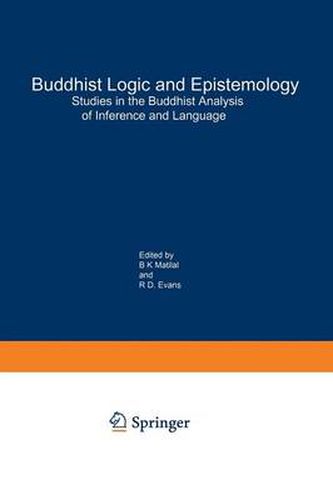Readings Newsletter
Become a Readings Member to make your shopping experience even easier.
Sign in or sign up for free!
You’re not far away from qualifying for FREE standard shipping within Australia
You’ve qualified for FREE standard shipping within Australia
The cart is loading…






This title is printed to order. This book may have been self-published. If so, we cannot guarantee the quality of the content. In the main most books will have gone through the editing process however some may not. We therefore suggest that you be aware of this before ordering this book. If in doubt check either the author or publisher’s details as we are unable to accept any returns unless they are faulty. Please contact us if you have any questions.
For the first time in recent history, seventeen scholars from allover the world (India, Japan, Europe, the United Kingdom, Canada and the United States) collaborated here to produce a volume containing an in-depth study of Buddhist log ical theory in the background of Buddhist epistemology. The Tibetan tradition identifies this important chapter in the history of Buddhist philosophy as the prama~a school. It owes its origin to the writings of the great Buddhist master, Dih naga (circa A. D. 480-540), whose influence was to spread far beyond India, as well as to his celebrated interpreter of sev enth century A. D. , Dharmakirti, whose texts presented the standard version of the school for the later Buddhist and non Buddhist authors for a long time. The history of Buddhist and Indian logical and epistemo logical theories constitutes an interesting study not only for the Buddhist scholars but also for philosophers as well as historians of philosophy in general. Each author of this anthology combines historical and philological scholarship with philosophical acumen and linguistic insight. Each of them uses original textual (Tibetan or Sanskirt) material to resolve logical issues and philosophical questions. Attention has been focused upon two crucial philosophical concepts: trairupya (the triple character of evidence) and apoha (meaning as exclusion ). Broadly the issues are concerned with the problems of inductive logic and the problem of mean ing and universals.
$9.00 standard shipping within Australia
FREE standard shipping within Australia for orders over $100.00
Express & International shipping calculated at checkout
This title is printed to order. This book may have been self-published. If so, we cannot guarantee the quality of the content. In the main most books will have gone through the editing process however some may not. We therefore suggest that you be aware of this before ordering this book. If in doubt check either the author or publisher’s details as we are unable to accept any returns unless they are faulty. Please contact us if you have any questions.
For the first time in recent history, seventeen scholars from allover the world (India, Japan, Europe, the United Kingdom, Canada and the United States) collaborated here to produce a volume containing an in-depth study of Buddhist log ical theory in the background of Buddhist epistemology. The Tibetan tradition identifies this important chapter in the history of Buddhist philosophy as the prama~a school. It owes its origin to the writings of the great Buddhist master, Dih naga (circa A. D. 480-540), whose influence was to spread far beyond India, as well as to his celebrated interpreter of sev enth century A. D. , Dharmakirti, whose texts presented the standard version of the school for the later Buddhist and non Buddhist authors for a long time. The history of Buddhist and Indian logical and epistemo logical theories constitutes an interesting study not only for the Buddhist scholars but also for philosophers as well as historians of philosophy in general. Each author of this anthology combines historical and philological scholarship with philosophical acumen and linguistic insight. Each of them uses original textual (Tibetan or Sanskirt) material to resolve logical issues and philosophical questions. Attention has been focused upon two crucial philosophical concepts: trairupya (the triple character of evidence) and apoha (meaning as exclusion ). Broadly the issues are concerned with the problems of inductive logic and the problem of mean ing and universals.